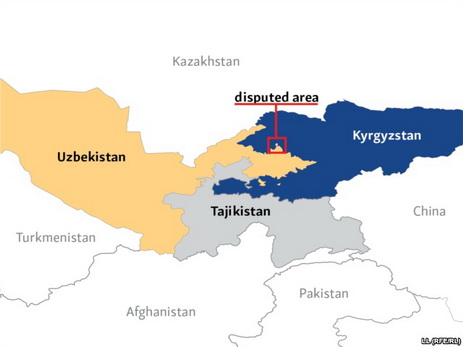Central Asia’s ‘Karabakhs’ may be even more dangerous than the original

BISHKEK (TCA) — As Kyrgyzstan and Uzbekistan have been involved in tensions concerning disputed border areas in the Ferghana Valley, a densely populated region shared by Kyrgyzstan, Tajikistan and Uzbekistan, we are republishing an article by Paul Goble, entitled “Central Asia’s ‘Karabakhs’ may be even more dangerous than the original”, originally published by the Jamestown Foundation’s Eurasia Daily Monitor, which draws a parallel between the Caucasus and Central Asia. The article is below:
The renewed violence in Azerbaijan’s separatist region of Karabakh is attracting attention to three larger problems in other parts of the former Soviet space: the existence of ethnic exclaves in neighboring countries, the continuing failure of the states of the region to agree on borders, and problems of national identity among those who were forced, in Soviet times, to declare one ethnicity when, in fact, they felt themselves to be members of another.
Nowhere are these problems greater than in the five countries of Central Asia—Kazakhstan, Uzbekistan, Kyrgyzstan, Tajikistan and Turkmenistan. Indeed, there are compelling reasons to believe that precisely because—rather than in spite—of their common Islamic heritage, these conflicts may prove even more explosive than the Armenian-Azerbaijani clashes in the Caucasus. And such potential clashes in Central Asia may end up involving a variety of outside powers and forces, overwhelming the capacity of the states there to control the situation.
The extent and possibly explosive nature of all these problems has been largely ignored by the West, with most observers assuming that because all the countries in the region are Muslim, they will not fight over enclaves or borders the way that the Christian Armenians and the Muslim Azerbaijanis have. The Islamic heritage of Central Asia is important. But there are three reasons why it is less able to prevent the emergence of such conflicts.
First, national identity is stronger than Islam in many cases (see EDM, May 28, 2013; August 11, 2015). Being an Uzbek or being a Kyrgyz is simply more important for many of the people in those two countries than being anything else.
Second, these countries have moved into different geopolitical spaces and are being armed by different outside powers. Thus, Uzbekistan receives most of its military needs from the West, while Kyrgyzstan obtains almost all of its weapons from Russia. Consequently, the national divisions are reinforced by broader geopolitical forces. Some outside powers believe this reality actually gives them leverage to prevent conflicts in the region. But such multi-vector arms trading may, in fact, provide certain outside powers with a greater opportunity to promote regional instability when it suits their purposes.
And third—and this is by far the most important factor, although also the least recognized—the rise of Islamist influence in Central Asia, while nominally supranational, is in fact exacerbating national tensions. Indeed, groups coming from Afghanistan or the greater Middle East, either for tactical or strategic reasons, are exploiting local national disputes to win supporters. Consequently, the fact that Uzbeks and Kyrgyz are both Muslims may make the likelihood of conflict between them greater, at least in the short term, if some members of the former nationality are attracted to one Islamist trend, while some members of the latter are attracted to another. That is clearly the lesson of Iraq and Syria, although it is seldom extended to Central Asia.
This third aspect of what might be called the “Karabakh” problem in Central Asia seems likely to be the most worrisome in the coming months and years. When Joseph Stalin drew the borders in Central Asia in the 1920s, he not only included many Tajiks in Uzbekistan and Uzbeks in Kyrgyzstan and Tajikistan but required, by force, that those so included identify not as they thought themselves to be but as members of the titular nationality. Thus, Uzbeks living in Tajikistan were required to register as Tajiks and Tajiks in Uzbekistan as Uzbeks.
Because the Stalinist and, indeed more broadly, the Soviet system of ethnic management was based on language rather than culture, this was less of a problem than it might seem. Most of the people involved were bilingual or multi-lingual and thus were forced to choose between or among their languages rather than give up one and choose another. But with the demise of the Soviet Union, many of those whose parents or grandparents or even great-grandparents were forced to re-identify are now seeking to recover their roots and are looking back to their original identities.
Conflicts over exclaves—like the ones that have heated up in recent months in Kyrgyzstan and Tajikistan (see EDM, August 11, 2015)—and over unsettled borders (see EDM, March 31, 2016), which are problems across the region, are by their very nature “ethnicizing.” In other words, such conflicts make people on both sides more sensitive to their nationality—original or imposed. One sees that in Azerbaijan and Armenia, where the Karabakh conflict is for many at the core of the definition of what it means to be a member of one nationality over the other.
In the case of the countries of Central Asia, as Aleksandr Shustov suggests in his essay on “Karabakh, Central Asian Style,” the consequences of this intensified or recovered ethnic identity could have fatal consequences for the existing states, calling into question not only their existing borders but also their very existences (Stoletie.ru, April 18). If that should come to pass in even one or two instances in that region, then the Central Asian “Karabakhs” truly would be more dangerous than the original.














